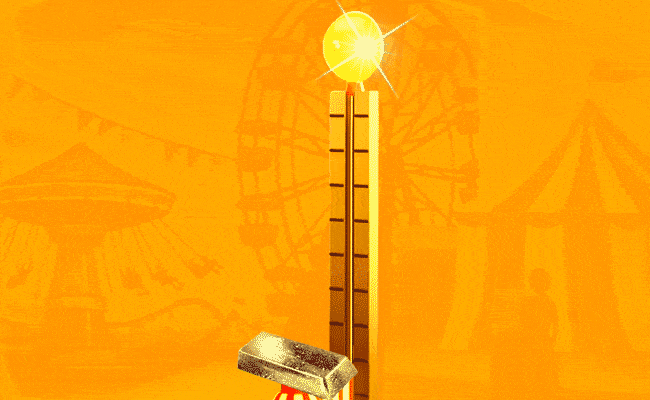I am big on nostalgia, especially when I think back to my formative years on the trading floor of the JSE. I can never forget the shame and worthlessness I felt when I mistakenly handed my father – a highly respected personality on the floor – an order to buy 10,000 shares of Loraine Gold Mines at 40c each, instead of just 1,000. Mannie Fisher, the seller, graciously spared me the repercussions, but not the indignity of my father’s tirade of stinging expletives in front of a crowd of baying dealers. A lesson etched in my psyche forever.
Nor can I dispel the despair of sitting with my good friend and colleague, Jack Shapiro, at an Italian restaurant in Braamfontein at lunchtime in late October 1987, sipping chianti and singing Bobby McFerrin’s Don’t Worry, Be Happy after the JSE plunged 23%, its largest one-day decline in history.
Yet, the majority of my memories are happy. Like the festive atmosphere of “My Big Fat JSE Listing”, a Greek-style celebration on the trading floor, marking the debut of Loucas Pouroulis’s Lefkochrysos platinum mine in 1987. Or the joy of regularly completing the JSE 50km marathon that ran between Joburg and Pretoria. And, of course, those relaxed Friday evenings spent unwinding at the Bulls and Bears after a long trading week.
While nostalgia offers warmth and comfort, it is also a reminder that the moments we treasure can never be fully recaptured. More importantly, nostalgia is no foundation on which to build an investment strategy – it looks backward, while a successful investing plan demands a view forward.
As a regular attendee at the Berkshire Hathaway annual shareholders’ meetings in the early 2000s, I often witnessed Warren Buffett respond to questions about his reluctance to invest in technology. His answer was consistent: he avoided businesses he did not fully understand. He would then remark that, 20 years from now, children would still be chewing Wrigley’s gum and drinking Coca-Cola. Yet today teenagers stroll around sipping from Stanley Quenchers, editing TikTok videos on iPhones. Times have changed; so too have products and habits.
Back in 1972, international communication on the market was anything but smooth. There were no automatic international dialling systems or instant access to financial data. We relied on telex machines and coded telegrams to correspond with overseas partners and maintained company records filled with clippings from local newspapers. Today, I can sit on the deck at Skukuza in the Kruger National Park, watching a herd of elephants drink from the Sabie River, while painlessly placing trades on Wall Street or analysing corporate reports online.
It’s those shifts that can dramatically shape financial markets over time – swings in the economy, advancements in technology, changes in regulation and evolving geopolitical events. While the past might remind you how certain investments once performed or nurture the satisfaction they once brought, putting your faith in these feelings can lead to biases and poor decision-making. Markets evolve and what was once a winning strategy does not guarantee future success.
A turning tide
More than 15 years ago, I began encouraging clients to invest offshore, driven by the belief that global markets offered a broader selection of companies with attractive prospects. My catchphrase at the time – “Why buy in a spaza when you can shop in a supermarket” – captured this thinking.
Initially, my vision was met with scepticism, particularly in the early 2000s, when booming Chinese growth and surging commodity prices propelled local mining stocks and the JSE to outperform global indices. Between January 2000 and the end of 2010, the JSE (in US dollars) delivered a remarkable return of 260% (12.25% per annum), while the S&P 500 posted a loss of 14.5% (-1.4% per annum) over the same period.
The tide started turning in 2007 when cracks in the global economy emerged, with a rise in mortgage defaults among subprime borrowers in the US. The mounting financial crisis that gathered force with the collapse of Lehman Brothers in September 2008 began souring the JSE’s stellar performance. Business and consumer confidence faltered, China’s economic momentum slowed, and metal prices plunged.
The JSE never fully recovered.
From January 2011 to mid-2025 – a span of 14.5 years – the JSE has gained just 32% (less than 2% per annum). In stark contrast, the S&P 500 has surged 410% (12% per annum), driven by the meteoric rise of tech giants and transformative innovations in social media, digitisation and AI.
Despite this, some market commentators continue to acclaim the JSE’s performance over the past 25 years – where it has marginally outpaced the S&P 500 – as evidence that history may repeat itself. But this strategy feels more nostalgic than insightful.
Past performance is not a reliable compass. Successful investment strategies must be grounded in data-driven analysis, real-time market dynamics, and a deep understanding of the forces shaping today’s global economy. In a rapidly evolving financial landscape, adaptability and a forward-thinking mindset are no longer optional – they are essential.
David Shapiro is one of the JSE’s most well-known veterans – a stockbroker with more than 50 years’ experience in the markets. He is the global equity strategist at Sasfin Securities.
Top image: Rawpixel/Currency collage.
Sign up to Currency’s weekly newsletters to receive your own bulletin of weekday news and weekend treats. Register here.











This was a great article. While I am way too young to know about the good times, since I have become aware of markets, it definitely hasn’t been a pretty picture locally. The only good performances locally come for a limited time driven by sporadic, one-off events.
Great article,David…………Remember Mannie Fischer also ran the Book on the Durban July……..